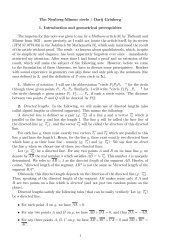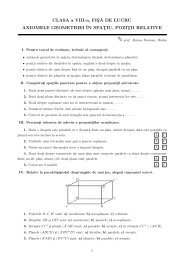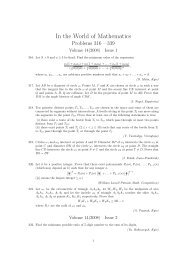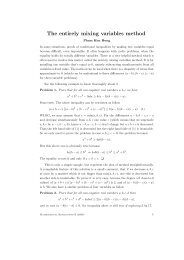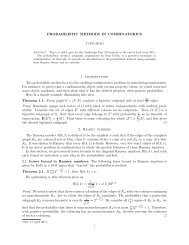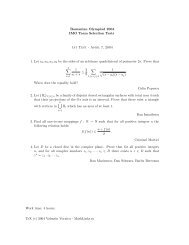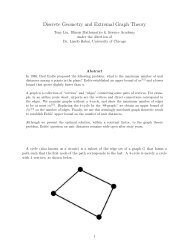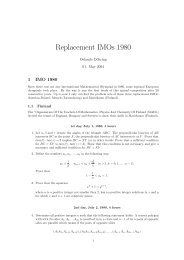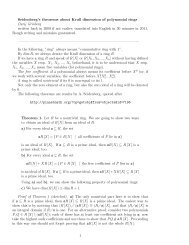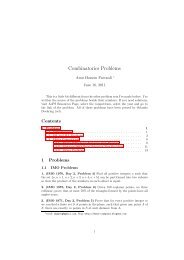Algebra (Unknown 27). - Index of
Algebra (Unknown 27). - Index of
Algebra (Unknown 27). - Index of
You also want an ePaper? Increase the reach of your titles
YUMPU automatically turns print PDFs into web optimized ePapers that Google loves.
2005/2006 17<br />
principal). More generally, Z[X 1 , . . . , X n ], F [X 1 , . . . , X n ] ( F is a field) are unique<br />
factorization domains.<br />
2. Prime elements <strong>of</strong> F [X][Y ]: irreducible polynomials in F [X] and irreducible<br />
polynomials f(X, Y ) = g 0 (X) + g 1 (X)Y + · · · + g n (X)Y n in F [X, Y ], n > 0, such<br />
that (g 0 (X), . . . , g n (X)) = F [X]. Note that F [X][Y ] is not a PID.<br />
6.8. Reduction criterion <strong>of</strong> irreducibility. Let A be a unique factorization domain<br />
and p a prime element <strong>of</strong> A such that F = A/pA is a field. Let f(X) ∈ A[X] be a<br />
polynomial <strong>of</strong> positive degree whose leading coefficient is not divisible by p. Denote<br />
the image <strong>of</strong> f(X) in A[X]/pA[X] by f(X). If f(X) is irreducible in F [X] then<br />
f(X) is an irreducible primitive polynomial in A[X].<br />
Pro<strong>of</strong>. If f = gh with polynomial g, h over A <strong>of</strong> positive degree then their leading<br />
coefficients are not divisible by p. Hence f = gh with polynomials g, h <strong>of</strong> positive<br />
degree, a contradiction.<br />
Example. X 2 + X + 1 has no roots in Z/2Z, hence it is irreducible over Z/2Z.<br />
Then (2n + 1)X 2 + (2l + 1)X + (2k + 1) is irreducible in Z[X] for all integer n, l, k.<br />
6.9. Eisenstein criterion <strong>of</strong> irreducibility. Let p be a prime element <strong>of</strong> A. Let<br />
f(X) = a n X n + · · · + a 0 ∈ A[X],<br />
n > 0. Assume that a n isn’t divisible by p, a n−1 , . . . , a 0 are divisible by p and a 0<br />
isn’t divisible by p 2 . Then f(X) is an irreducible polynomial in A[X] and in K[X].<br />
Pro<strong>of</strong>. If f = gh with polynomials g, h over A <strong>of</strong> positive degree then their leading<br />
coefficients are not divisible by p. Let g(X) = b m X m + · · · + b 0 and h(X) =<br />
c l X l + · · · + c 0 . Since a 0 = b 0 c 0 is divisible by p and not by p 2 , only one, say b 0 is<br />
divisible by p and c 0 is relatively prime to p. Let s 0 be the smallest integer such<br />
that b s is not divisible by p. Then a s = b s c 0 + ∑ 0




